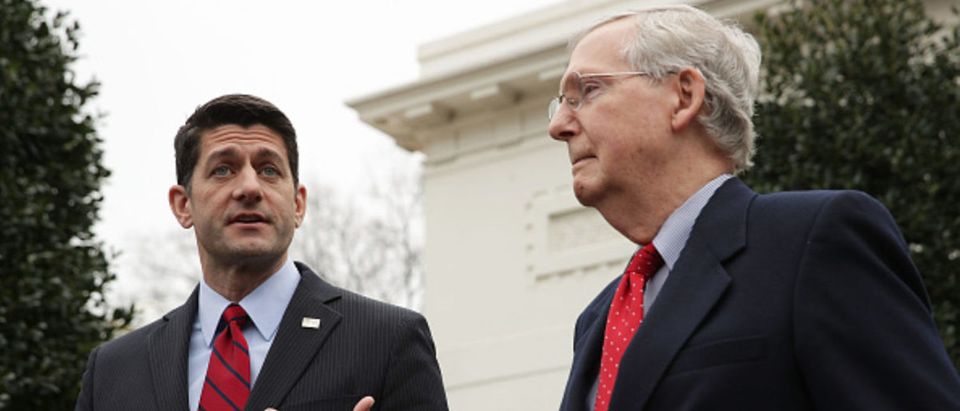Members of Congress returned to Washington Tuesday morning with a full docket for September and roughly three weeks to accomplish both must-pass legislation and other extraneous measures that need to be dealt with before the end of the month.
1) Fund The U.S. Government
Congress has no choice but to pass a spending bill before or on Sept. 30 to fund the U.S. government. If Congress fails to pass said bill before Oct. 1, portions of the government will be forced to shut down and all non-essential government employees will forgo payment until an agreement is met. If lawmakers pass a continuing resolution, which is the current plan, they will not have to make a decision until some agreed upon future date. During that period, spending levels would remain unchanged.
2) Raise The Debt Ceiling
The debt ceiling — the limit on the amount of money the government can borrow through debt issued by the U.S. Treasury — also poses a problem for Republican leadership in Congress. If Congress does not come to an agreement on the raising the debt ceiling, the U.S. Treasury will be unable to pay its liabilities in October, which has the potential to downgrade the U.S. credit rating. (RELATED: 3 Obstacles To Passing Trump’s Massive Tax Reform Cut)
Treasury Secretary Steve Mnuchin urged Congress in late May to raise the debt ceiling before leaving for the August recess, or even sooner, to avoid shocking financial markets and imposing some potentially dire liquidity risks. Mnuchin enacted “extraordinary measures” in March to ensure that the federal government could pay its bills through the summer, but warned that those measures would be ineffective at staving off a solvency crisis in the fall.
The administration announced in late August that it wants lawmakers to pass a “clean” debt ceiling increase, meaning a piece of legislation that raises the debt limit with no additional measures attached.
3) Emergency Relief For Hurricane Harvey Victims
The White House asked Congress Friday afternoon for $7.85 billion to provide relief to the victims of Hurricane Harvey, in addition to raising the debt ceiling. Republicans in the House answered the call Sunday evening with an inital proposal that meets the White House’s requests.
4) DACA
President Donald Trump called on Congress Tuesday morning to make a decision on the Deferred Action for Childhood Arrivals program (DACA). The program provides protection for roughly 800,000 young men and women who are unauthorized immigrants, and has allowed them to work in the country legally since 2012.
It is estimated that the average age of DACA recipients is below 16-years-old–which is the ceiling for young men and women to be eligible for the program.
If Congress did away with DACA, it would effect immigrants to varying degrees. Those working full-time jobs would have to forfeit their employment to comply with the law. If they choose not to do so, they would be putting both themselves and their employers at risk. Those enrolled in school could stay (with a few exceptions) but could be at risk of losing financial aid.
The main threat to DACA recipients is that of deportation. Since the government has extensive information on those enrolled in the program, the program’s recipients could easily be found, arrested and deported. The Obama administration protected these individual’s information, but Trump signed an executive order in January that helped ease the restrictions on obtaining said data.
No one knows for sure what will happen if the administration and Congress does away with DACA, but uncertainty for DACA recipients will continue until a final decision is made.
5) Obamacare Subsidies
Major health insurance providers must finalize their rate increases for 2018 by Tuesday. The Trump administration extended the 2018 rate filing period three weeks in August to give insurance providers more time to calculate price increases and their relative risk exposure when offering plans on the Obamacare state exchanges.
Trump has threatened on multiple occasions to cut off funding for Obamacare subsidies–commonly known in health care policy circles as “cost-sharing reductions.” These subsidies help low-to-moderate income individuals purchase health insurance on the Obamacare exchanges.
The administration has been funding these payments on a month-to-month basis, which has greatly increased uncertainty for insurance providers as to whether or not the administration will keep paying them out. As insurance companies announced their exits from the Obamacare marketplace in 2017, they repeatedly noted uncertainty regarding Obamacare subsidies as a primary reason for their exit. (RELATED: Here’s The Real Reason Trump Is Angry With McConnell)
There are rumors that Senate Majority Leader Mitch McConnell and House Speaker Paul Ryan are planning to pass legislation that would raise the debt ceiling and fully fund Obamacare subsidies through the 2018 election cycle, a source within the administration told TheDCNF. Whether or not that plays out, insurance companies will be looking towards the administration and Republican leadership in Congress to come a decision.
Send tips to robert@dailycallernewsfoundation.org
All content created by the Daily Caller News Foundation, an independent and nonpartisan newswire service, is available without charge to any legitimate news publisher that can provide a large audience. All republished articles must include our logo, our reporter’s byline and their DCNF affiliation. For any questions about our guidelines or partnering with us, please contact licensing@dailycallernewsfoundation.org.


